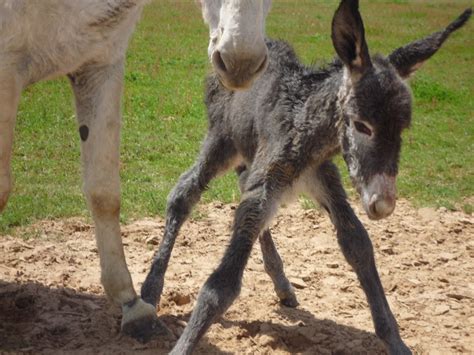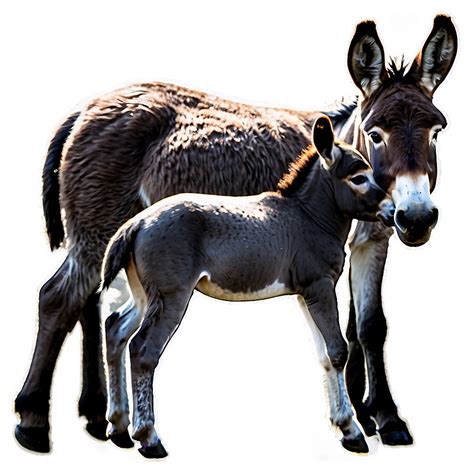
A Texas couple credits their donkey, Jenny, with ensuring the safe delivery of their newborn son, James, after the mother, Heather Barajas, went into labor unexpectedly at home. Jenny alerted the father, Dr. James Barajas, to the situation and remained a comforting presence throughout the birth.
AUSTIN, TX – When Heather Barajas went into labor in the early hours of October 4th at her home in Austin, Texas, she wasn’t expecting her donkey, Jenny, to play such a pivotal role. However, Jenny, the family’s beloved donkey, became an unlikely hero, alerting Dr. James Barajas, Heather’s husband, to the impending birth of their son, James. According to Heather, Jenny’s persistent braying outside their bedroom window was the initial signal that something was amiss.
“I woke up to Jenny outside our bedroom window braying her head off,” Heather told Yahoo Lifestyle. “She doesn’t do that unless something is wrong.”
Dr. Barajas, a trained physician, quickly realized that his wife was in active labor. With their planned home birth progressing more rapidly than anticipated and their midwife still en route, Dr. Barajas found himself needing to assist in the delivery. What he didn’t expect was that Jenny would stay put near the window.
“She stayed right there the whole time, just looking in the window, making sure we were OK,” Heather recounted.
Jenny’s presence proved to be more than just a quirky anecdote. Her calm demeanor and watchful gaze seemed to provide Heather with a sense of comfort and reassurance during a potentially stressful situation. Dr. Barajas also noted that Jenny’s presence helped to ground him, allowing him to focus on the task at hand – ensuring the safe delivery of his son.
The delivery was successful, and baby James was born healthy at 6:57 a.m., weighing 7 lbs., 15 oz. After the birth, Jenny was finally able to relax, taking a well-deserved nap in the yard.
“After the baby was born, she finally took a break and went and laid down,” Heather shared.
The Barajas family sees Jenny as more than just a pet; they consider her an integral part of their family. They acquired Jenny several years ago to help manage the vegetation on their property, but she quickly became a beloved companion. This unexpected experience has only strengthened their bond with Jenny, further solidifying her place in their hearts.
“She’s a very special donkey,” Heather said.
A Rapid Delivery and an Unlikely Midwife’s Assistant
The Barajas family had planned a home birth, opting for the comfort and familiarity of their own surroundings. However, the speed at which Heather’s labor progressed caught them slightly off guard. While they had a midwife scheduled to attend the birth, the rapid onset of labor meant that Dr. Barajas was the primary caregiver during the initial stages.
The role Jenny played in the delivery highlights the often-unrecognized sensitivity and intelligence of animals. While donkeys are often perceived as stubborn or simple creatures, Jenny’s actions demonstrate a capacity for empathy and a keen awareness of her surroundings. Her persistent braying served as a crucial alert, and her subsequent presence provided unexpected emotional support.
Veterinarians and animal behaviorists often emphasize the importance of understanding animal behavior within the context of their environment and social dynamics. Jenny’s connection with the Barajas family likely contributed to her protective instincts and her willingness to intervene when she sensed that something was amiss.
The Bond Between Humans and Animals
The story of Jenny and baby James underscores the profound bond that can exist between humans and animals. For centuries, animals have played vital roles in human societies, providing companionship, assistance with labor, and even emotional support. In recent years, there has been a growing recognition of the therapeutic benefits of animal interaction, particularly for individuals struggling with mental health challenges.
Animal-assisted therapy has become increasingly popular, with studies demonstrating its effectiveness in reducing anxiety, depression, and loneliness. Animals can provide a sense of unconditional love and acceptance, which can be particularly valuable for individuals who have experienced trauma or social isolation.
The Barajas family’s experience with Jenny is a testament to the power of the human-animal bond. Jenny’s actions were not merely a random occurrence; they were a reflection of the deep connection she shared with Heather and Dr. Barajas. Her protective instincts and her desire to provide comfort highlight the capacity of animals to form meaningful relationships with humans.
Donkeys as Emotional Support Animals
While dogs and cats are the most common types of emotional support animals, donkeys are increasingly being recognized for their therapeutic potential. Donkeys are known for their gentle nature, their calm demeanor, and their ability to form strong bonds with humans. These qualities make them well-suited to providing emotional support to individuals struggling with anxiety, depression, or other mental health challenges.
Several organizations now offer donkey-assisted therapy programs, providing individuals with the opportunity to interact with donkeys in a safe and supportive environment. These programs often involve activities such as grooming, walking, and simply spending time with the donkeys. Participants report feeling a sense of calm and relaxation during these interactions, as well as a reduction in anxiety and stress.
The Barajas family’s experience with Jenny provides further evidence of the therapeutic potential of donkeys. Jenny’s presence during Heather’s labor was undoubtedly a source of comfort and reassurance, and her actions demonstrate the capacity of donkeys to provide emotional support in times of need.
Home Births: Considerations and Trends
The Barajas family’s decision to have a home birth reflects a growing trend in the United States and other developed countries. Home births offer several potential benefits, including increased control over the birthing environment, reduced medical interventions, and a more personalized birthing experience. However, home births also carry certain risks, and it is essential to carefully consider these risks before making a decision.
The American College of Obstetricians and Gynecologists (ACOG) acknowledges the right of women to choose their preferred birth setting but emphasizes the importance of informed decision-making. ACOG recommends that women considering home birth should be carefully screened to ensure that they are low-risk and that they have access to qualified medical professionals in the event of complications.
Statistics on home births vary depending on the region and the data source. However, in general, home births account for a small percentage of all births in the United States. According to the Centers for Disease Control and Prevention (CDC), home births accounted for approximately 1.1% of all births in the United States in 2020.
The decision to have a home birth is a personal one that should be made in consultation with a qualified healthcare provider. It is essential to carefully weigh the potential benefits and risks before making a decision and to ensure that you have a comprehensive plan in place in the event of complications. The Barajas family had planned this home birth, ensuring they had a professional coming to their house, though Jenny sped up the process.
The Role of Animals in Childbirth Throughout History
While Jenny’s specific role in the Barajas’ childbirth story might be unusual, the presence and comfort provided by animals during pregnancy and childbirth have been noted throughout history. In many cultures, animals are seen as symbols of fertility and protection, and their presence is believed to bring good luck and ward off evil spirits.
Historically, in agrarian societies, animals were often present during childbirth simply because births occurred in the home, which was also the animals’ living space. Women may have found comfort in the familiar presence of animals, particularly those with whom they had a strong bond.
Furthermore, in some indigenous cultures, animals are believed to possess spiritual powers that can aid in the birthing process. Midwives may incorporate animal imagery or rituals into their practices to invoke these powers and ensure a safe and successful delivery.
While modern medicine has largely replaced these traditional beliefs and practices, the emotional and psychological benefits of having animals present during childbirth remain relevant. The Barajas family’s experience with Jenny highlights the enduring power of the human-animal bond and the unique ways in which animals can provide support and comfort during significant life events.
Social Media Reaction
The story of Jenny the donkey has garnered significant attention on social media, with many users expressing amazement and amusement at the unusual circumstances of the birth. The heartwarming narrative has resonated with animal lovers and parents alike, generating a flurry of comments and shares.
Many social media users have praised Jenny for her quick thinking and her ability to sense that something was wrong. Some have even jokingly suggested that Jenny should be nominated for “Donkey of the Year.” Others have shared their own stories of animals providing comfort and support during times of stress.
The Barajas family has expressed gratitude for the outpouring of support and positive feedback they have received. They hope that Jenny’s story will inspire others to appreciate the unique bond that can exist between humans and animals.
Expanding the Family and Future Plans
With the arrival of baby James, the Barajas family is now adjusting to life as a family of three. They are enjoying spending time with their newborn son and watching him grow and develop. Jenny has also taken a keen interest in the new addition to the family, often gazing at him with curiosity and affection.
The Barajas family plans to continue to integrate Jenny into their family life and to provide her with plenty of love and attention. They also hope to share Jenny’s story with others and to raise awareness about the therapeutic potential of donkeys.
In the future, they may even consider starting a donkey-assisted therapy program to help others experience the benefits of interacting with these gentle and compassionate animals. For now, they’re simply enjoying the unique bond they share with Jenny and celebrating the arrival of their son.
The Long-Term Impact on the Family
The experience with Jenny during the birth of James will undoubtedly have a lasting impact on the Barajas family. It has reinforced their belief in the power of the human-animal bond and has deepened their appreciation for the unique qualities of donkeys.
They plan to share the story of Jenny with James as he grows up, teaching him about the importance of kindness, compassion, and respect for all living creatures. They also hope that James will develop a strong bond with Jenny and that she will continue to be a cherished member of their family for many years to come.
The Barajas family’s story is a reminder that sometimes the most unexpected heroes can emerge in the most unexpected circumstances. Jenny’s actions on that fateful morning demonstrate the extraordinary capacity of animals to provide comfort, support, and even lifesaving assistance to humans. Her story is a testament to the enduring power of the human-animal bond and the unique ways in which animals enrich our lives.
Donkey Breeds and Their Temperaments
Understanding the temperament and characteristics of different donkey breeds provides further context to Jenny’s behavior. While individual personalities vary, certain breeds are generally known for their gentle nature and suitability for companionship.
The American Mammoth Jackstock, one of the largest donkey breeds, is known for its strength and intelligence. Despite their size, they are often docile and affectionate, making them good companions. Miniature Mediterranean Donkeys, as their name suggests, are much smaller and are renowned for their friendly and affectionate personalities. They are often used as therapy animals due to their gentle nature and ease of handling. Standard donkeys, like Jenny, are of medium size and possess a balanced temperament, making them versatile animals for various purposes. They are generally intelligent, patient, and willing to learn.
Regardless of the breed, early socialization and consistent training are crucial for developing a well-adjusted donkey. Donkeys that are handled gently and exposed to a variety of experiences from a young age are more likely to be confident, friendly, and responsive to human interaction. Jenny’s positive relationship with the Barajas family likely contributed to her protective instincts and her willingness to assist during the childbirth.
The Broader Implications of Animal Intelligence
The story of Jenny the donkey contributes to the ongoing discussion about animal intelligence and the capacity for animals to understand and respond to human emotions. While it is impossible to definitively know what Jenny was thinking or feeling during the childbirth, her actions suggest a level of awareness and empathy that is often underestimated in animals.
Research in animal cognition has revealed that many species possess complex cognitive abilities, including problem-solving skills, memory, and the ability to recognize and respond to human emotions. Dogs, for example, are known for their ability to interpret human facial expressions and body language, and they often provide comfort to their owners when they are feeling sad or stressed.
Elephants are highly intelligent animals with strong social bonds, and they have been observed displaying empathy and compassion towards other members of their herd. Even animals that are often considered to be less intelligent, such as chickens, have been shown to possess cognitive abilities that are more advanced than previously thought.
The Barajas family’s experience with Jenny adds to the growing body of evidence that animals are capable of forming deep emotional connections with humans and that they can play a significant role in our lives. It is a reminder that we should treat animals with respect and compassion and that we should recognize the valuable contributions they make to our society.
The Economic Considerations of Owning a Donkey
Owning a donkey, like any animal, involves certain financial responsibilities. The cost of purchasing a donkey can vary depending on the breed, age, and training of the animal. Miniature donkeys, for example, may be more expensive than standard donkeys due to their popularity as pets.
In addition to the purchase price, there are ongoing costs associated with donkey ownership, including food, shelter, veterinary care, and farrier services (trimming their hooves). Donkeys require a diet of hay or pasture, as well as access to fresh water. They also need a safe and dry shelter to protect them from the elements.
Regular veterinary checkups are essential to ensure that donkeys remain healthy and free from disease. Farrier services are also necessary to keep their hooves properly trimmed and to prevent lameness. The specific costs associated with donkey ownership will vary depending on the region and the individual needs of the animal. However, it is important to carefully consider these costs before acquiring a donkey to ensure that you can provide them with the care they need. The Barajas family likely factored these costs in when choosing Jenny, as they sought to have them maintain the vegetation of their property.
The Legal Considerations of Owning a Donkey
In addition to the financial responsibilities, there are also legal considerations associated with owning a donkey. Local ordinances and regulations may dictate where donkeys are permitted to be kept and what types of fencing are required.
Some jurisdictions may also have specific regulations regarding the care and treatment of donkeys, such as requirements for providing adequate food, water, and shelter. It is important to familiarize yourself with these regulations before acquiring a donkey to ensure that you are in compliance with the law.
Furthermore, it is important to consider liability issues associated with owning a donkey. If a donkey were to injure someone or damage property, the owner could be held liable. It is advisable to obtain liability insurance to protect yourself in the event of such an incident.
FAQ Section
Q1: What prompted the donkey, Jenny, to alert the family about the labor?
A1: Heather Barajas stated that Jenny began braying persistently outside their bedroom window, an unusual behavior for her. Heather said, “She doesn’t do that unless something is wrong.” This unusual braying alerted Dr. Barajas, Heather’s husband, to the fact that she was in active labor.
Q2: Did the family expect the birth to happen so quickly at home?
A2: The family had planned a home birth with a midwife. However, the labor progressed much faster than anticipated. This rapid progression meant Dr. Barajas had to assist with the delivery before the midwife arrived.
Q3: How did Jenny behave during the actual delivery?
A3: According to Heather, Jenny stayed near the window throughout the delivery, watching and appearing to ensure everything was alright. “She stayed right there the whole time, just looking in the window, making sure we were OK,” Heather recounted, indicating Jenny’s constant presence and seeming concern.
Q4: What did Jenny do after the baby was born?
A4: After the successful delivery of baby James, Jenny finally relaxed and took a break. Heather mentioned, “After the baby was born, she finally took a break and went and laid down,” suggesting that Jenny felt relieved after the event.
Q5: How has this experience changed the family’s perception of Jenny?
A5: The Barajas family already considered Jenny a part of their family, but this experience has deepened their bond. Heather described Jenny as “a very special donkey,” highlighting the increased appreciation and affection they now have for her after her unexpected role in the birth of their son. This solidifies Jenny’s place as an integral and cherished member of their family.









